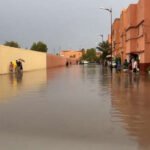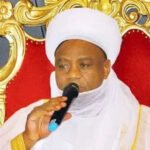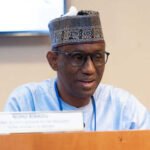Despite the promises made by Nigerian politicians during electioneering campaigns that they will give education the deserved priority, many successive leaders across the country have only paid little attention to the sector as a dark cloud hangs over education in the country, writes John Andah.
Young Nana-Firdausi Muhammad has a dream of becoming a medical doctor. But that dream has been cut short as her parents, who are farmers in Kagara area of Niger State, north-central Nigeria, cannot afford to pay for senior secondary education.
The 15-year-old, who dropped out of the Ahmadu Attahiru Secondary School in the Sabongari area of the community, feels angry every minute she spends at home during school hours.
‘I feel so bad about this. I cry almost every day seeing my mates going to school while I am at home because my parents cannot afford my school fees’, Nana-Firdausi, who spoke in Hausa, told Development Diaries.
Nana-Firdausi, who has five older siblings in a family of nine, is just one of at least 10.1 million Nigerian adolescents and youths of secondary school age whose right to education has been denied. There is, indeed, a dark cloud hanging over the education sector in Africa’s most populous nation.
SDG Four: Ensure inclusive and equitable quality education and promote lifelong learning opportunities for all
The United Nations Education, Scientific and Cultural Organisation (UNESCO), in a 2022 report, announced that the country had 20 million out-of-school children; although the federal government disputed this figure.
Also, figures from the United Nations International Children’s Emergency Fund (UNICEF) show that the majority of affected children are girls and over 60 percent of them are in the country’s northern region.
‘In Nigeria, out-of-school rates among adolescents and youth of secondary school age have hardly changed in 20 years, with the result that the out-of-school population in this age group increased by 61 percent, from 6.3 to 10.1 million’, the 2022 Reimagining Education in Nigeria civil society manifesto reads.
Despite the promises made by Nigerian politicians during electioneering campaigns that they will give education the deserved priority, many successive leaders across the country have only paid little attention to the sector.
‘When you look at the manifestoes of these candidates, we have not seen strong commitment to education and particularly for the girl-child, and if you look at most of the data, a lot of Nigerians have not decided who they would vote for’, the Chief Executive of Connected Development (CODE) and Malala Fund Education Champion, Hamzat Lawal, said.
He believes that there is no strong commitment in the manifestoes of political candidates to improving girl-child education in the country.
‘Prioritising education would mean candidates’ plan for proper education budgeting, especially how it affects girls’, he added.
‘It also includes their commitments to both international and local education policies and their plans to take the over 20 million children back to school, among others’.
The African example
Many African countries, including Kenya and Tanzania, have amended legislation and developed policies that increase the right to safe, free, quality education from nine to 12 years.
Data from WENR shows that in 2003, the government of Kenya instituted free primary education for all programmes, and then did the same for secondary education in 2008. This resulted in nearly three million more students being enroled in primary school in 2012 than in 2003 and the number of schools grew by 7,000.
However, Nigeria’s legislation only provides for nine years of free and compulsory education, hence children who wish to continue their education up to senior secondary level have to pay fees. But many Nigerians, like the parents of Nana-Firdausi, struggle to find the funds to keep their children in school.
Basic education manifesto
Speaking on the sorry state of basic education in the country, the Executive Director of Invictus Africa, Bukky Shonibare, emphasised that the government at all levels must increase education funding to cover 12 years of primary and secondary school education.
‘Beyond requesting for 12 years of basic education, there are surrounding issues that impact on girls’ access to free, basic, quality education’, she told Development Diaries.
‘One of which is the issue of funding, which was why as a coalition we started asking that the consolidated revenue fund should be extended from two percent to at least four percent. With that, we can have more funds to be able to address a lot of the issues around access to education as well as quality education in Nigeria’.
Shonibare’s organisation, Invictus Africa, is part of a coalition of international and local organisations in Nigeria that developed the aforementioned manifesto on basic education.
Other members of the coalition include the Education Champions Network (ECN) in Nigeria, Save the Children, Plan International, Civil Society Action Coalition on Education For All (CSACEFA) and Malala Fund.
‘One of the things the manifesto is asking is 12 years of free, basic, safe and quality education. But beyond that is asking that there should be progressive universalisation of education’, she added.
‘What that means is that we recognise intersectional issues as they relate to girls’ access to education. There are girls living with disabilities, there are girls in rural communities, there are girls in conflict-affected communities, there are girls who are from poor families. So what we are saying is that even in accessing 12 years of education, there should be special consideration for this set of people who are sort of victims of intersectional issues’.
Poor education funding
Data from the World Bank shows that despite being the second richest country in Africa, Nigeria spends less on education than all but one (Somalia) of the ten poorest African countries.
In fact, the federal government’s current budgetary allocation to education is 5.39 percent of its total budget of N21.83 trillion – that is a 50 percent reduction from what Nigeria budgeted for education in 2015.
‘What we are saying is that we should not be going down in terms of budgetary allocation; we should be going up so that we can realise at least 22.5 percent’, Shonibare said.
Making schools safe for learning is another advocacy ‘ask’ in the manifesto. Between 2020–2021, the Global Coalition to Protect Education from Attack identified at least 21 incidents of attacks on schools in the country.
Declaration without action
Nigeria endorsed the international Safe Schools Declaration in March 2015 and ratified it in 2019. Based on this declaration, the country is obliged to ensure programmes and policies to prevent and respond to attacks against schools and to fight impunity for such attacks.
However, four years after its ratification, the federal government failed to implement the emergency programme meant to increase access and quality of education for over 40 million schoolchildren.
The coalition is therefore demanding that students deprived of educational facilities as a result of the conflict, violence or crisis are promptly given access to accessible alternative temporary schools, in line with the National Guidelines for Accelerated Basic Education.
‘In conflict situations, girls’ education is being affected. But beyond conflict-related sex education, there is school-based violence that children are experiencing. There should be training for teachers on issues around school-based gender violence’, Shonibare said.
Accelerated education approach
Also speaking to Development Diaries, the Head of Social Development Programme at Plan International Nigeria, Laban Onisimus, called on state governments in Nigeria to adopt the accelerated education approach to reduce the number of out-of-school children.
Nigeria, in June 2022, launched the Accelerated Basic Education Programme (ABEP) to ensure that out-of-school children return to school.
The launch was under the auspices of the Nigerian Educational Research and Development Council (NERDC) with support from Plan International Nigeria and the European Union (EU).
‘Education cannot wait for crises. So we have engaged with the government to develop a curriculum that has been approved by the National Council of Education’, Onisimus said.
It is understood that the overarching objective of ABEP is to provide an alternative educational programme suitable for the needs of overage out-of-school children and youths, and in the process mainstream them to regular school programme or provide them with alternative career paths through enrolment into vocational training centres.
‘Yes, a child is ten years old, he has dropped out of school, or he has never been to school; for you to ask that child to go to a conventional school, he won’t fit in there because the learners are either older than him or younger than him’, Onisimus explained.
‘So there is a part way to it: establish community learning centres where that child will pass through nine months. By the time he is done with the nine months, based on a particular level, is an equivalent of either primary three or primary six of formal school’.
He added, ‘This curriculum that was developed by NEARC has been tested in some of those areas where we have displacements, like Borno, Yobe and Adamawa. And we have returned quite a number of children – close to 12,000 children – back to school’.
For the Chairman of the House Committee on Basic Education, Julius Ihonvbere, he advised political leaders to take the issue of out-of-school children seriously to avoid creating future criminals.
Specifically, the lawmaker called on presidential candidates for Nigeria’s 2023 elections to prioritise the issue and answer several questions emanating from the challenges posed by the menace.
‘Out-of-School children are more dangerous than banditry and it is as if we are breeding an army of threats to the nation’, he said.
‘So to say political leaders should take the issue as priority is an understatement. As a matter of fact, we will request that all presidential candidates tell us what they will do with out-of-school children problem Nigeria is facing’.
As the country gears up for another crucial general election, in 2023, what are the plans of the various candidates to buck the worrisome trend of out-of-school children and guarantee 12 years of uninterrupted education for Nigerian children?
This report is produced with support from YouthHubAfrica under its Basic Education Media Fellowship funded by Malala Fund and Rise Up.




